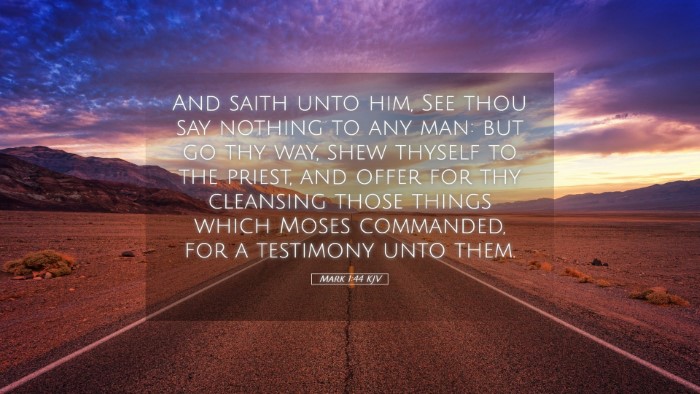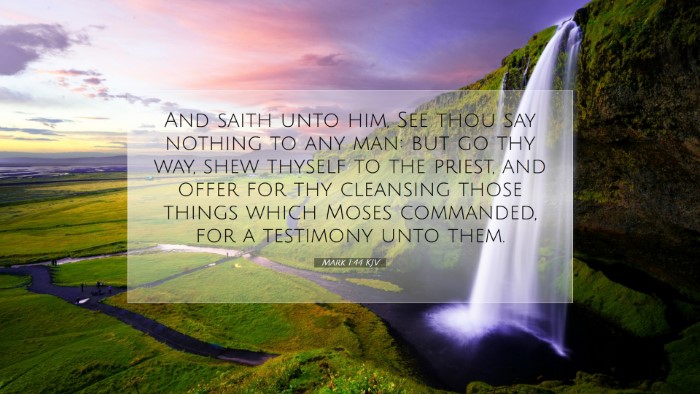Commentary on Mark 1:44
Verse: "And said unto him, See thou say nothing to any man: but go thy way, show thyself to the priest, and offer for thy cleansing those things which Moses commanded, for a testimony unto them."
Introduction
Mark 1:44 is a pivotal verse in the Gospel of Mark that encapsulates both the authority of Christ and the appropriate response to His miracles. This commentary synthesizes insights from various public domain commentaries, including those of Matthew Henry, Albert Barnes, and Adam Clarke, to provide a comprehensive examination relevant to pastors, students, theologians, and Bible scholars.
Contextual Overview
The passage is set in the early ministry of Jesus, where He has just performed the remarkable miracle of healing a leper. This act not only demonstrates Christ’s compassion and divine power but also sets the stage for His instructions to the healed man, which includes a significant social and religious directive.
Exegesis of Key Phrases
- "See thou say nothing to any man": Jesus instructs the man to keep silent about his healing. This reflects the Messianic secret motif prevalent in Mark's Gospel, where Jesus often seeks to avoid premature disclosure of His identity and mission. The silence is not merely to avoid fame but serves a deeper theological purpose—allowing His ministry to develop in accordance with divine timing (Barnes).
- "Go thy way, show thyself to the priest": Jesus directs the healed leper to follow the Jewish law as outlined in Leviticus 14. This emphasizes the importance of fulfilling the Law and shows that Jesus respects the existing religious structure. By directing the man to the priest, Jesus highlights the necessity of social reintegration post-healing (Henry).
- "Offer for thy cleansing those things which Moses commanded": The mention of Moses’ commands underlines the fulfillment of the Law through Christ. This action serves as a testimony to the priest and the people of His divine authority. It also serves as a means for the healed leper to publicly validate his cleansing and restore his place within the community.
Theological Implications
This verse raises significant theological themes that are crucial for understanding Jesus’ ministry:
- Fulfillment of the Law: By instructing the leper to adhere to the Law of Moses, Jesus demonstrates His role not as an antagonist to the Law but as its fulfillment (Matthew 5:17). This is vital for understanding Christ's relationship to the Mosaic Covenant (Clarke).
- Authority of Jesus: The command to keep silent highlights the authority that Jesus wields—not just as a healer but as the Son of God. This authority challenges the existing religious order and asserts that true cleansing comes from Him alone (Henry).
- Social Restitution: The command to present himself to the priest is not just about legal compliance; it signifies the holistic restoration that Jesus offers. Healing is not solely physical but encompasses social and spiritual dimensions essential for the full restoration of the individual (Barnes).
Reflections for Application
For contemporary churches and communities, Mark 1:44 offers several reflections:
- Obedience to Christ: The response of the healed man underscores the significance of obedience in the Christian life. Christ's commands should be followed even if they seem counterintuitive or challenge our expectations (Henry).
- Integration of Faith and Practice: The directive to visit the priest emphasizes the continuity of faith and community practices. Modern believers are called to engage with their communities and demonstrate their faith not only personally but also socially (Clarke).
- The Testimony of Healing: Sharing our testimonies of what Christ has done in our lives serves as a witness to others. However, this should be approached with discernment, ensuring that we glorify God above ourselves (Barnes).
Conclusion
Mark 1:44 serves as a profound reflection on the authority of Christ, the fulfillment of the Law, and the necessary steps toward social reintegration for the healed. Engaging deeply with this verse allows pastors, students, theologians, and scholars to understand the implications of Jesus’ ministry and the nature of true healing in light of His commands. As believers, we are called to heed His words, affirm our faith through action, and testify to the transformative power of His grace in our lives.


